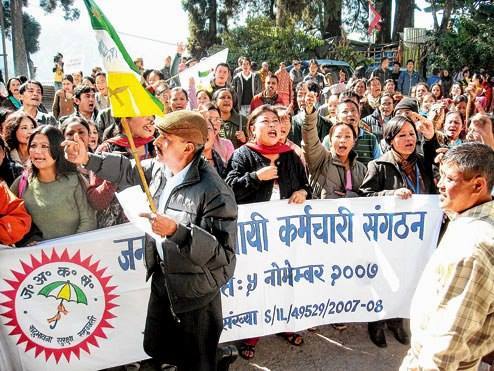Today, Giri and the three MLAs from the hills called on state education minister Partha Chatterjee in Kolkata and served a memorandum of demand following which they got the assurance. Speaking from Kolkata, Giri said, “We met the state education minister today and submitted a memorandum of our demands regarding regularising the voluntary teachers. The minister gave us a patient hearing and positive assurance.”
At present, 519 teachers are serving voluntarily in 129 junior, high and higher secondary schools in the hills. However, these teachers now want to be regularised and have started various forms of agitation under the aegis of the Janmukti Insecure Secondary Teachers’ Organisation (JISTO) to pressurise the state government.
 |
| Roshan Giri accompanied by hill MLAs Amar Singh Rai, Sarita Rai and Rohit Sharma met state education minister Partha Chatterjee |
“There are schools in the hills that have headmasters who have been given temporary charge. We want permanent status for them for the smooth functioning of the schools. We also raised the issue of enhancement of salary of the voluntary teachers as assured by the state government in 2014,” Giri said.
According to the GTA sabhasad, the education minister assured the delegation that the process to regularise the voluntary teachers would start on receiving the green signal from the state chief secretary. “We have been assured that the minister would start the process to absorb the voluntary teachers, form an ad-hoc selection board and enhance salary once the state chief secretary gives the directions,” said Giri.
When asked for his comment on the development, JISTO coordinator Amit Gurung said, “We have not received any information yet about the meeting between the GTA and the state education minister. We will first wait for the details of the proposed ad-hoc selection board to see if it benefits us and comment only then.”
A discrepancy to be noted here is that on May 20 last month, the joint secretary of the state school education department had written to the home and hill affairs department stating that regularisation, absorption and appointment of voluntary teachers in the GTA could not be entertained until they secure their candidature through the West Bengal School Service Commission, which ironically, has remained defunct in the hills since 2003.
Telegraph - The GTA Sabha member in charge of education, Roshan Giri, met state education minister Partha Chatterjee today and demanded that an ad hoc selection board be formed to make the 500-odd voluntary teachers in the hills permanent.
Giri, who was accompanied by hill MLAs Amar Singh Rai, Sarita Rai and Rohit Sharma, said: "We have demanded that an ad hoc selection board be formed to absorb the 519 voluntary teachers in the hills. Since 2003, the SSC (School Service Commission) has been lying defunct and that is why the managing committees of the schools have had to recruit voluntary teachers. After having served for so long, it is justified that their (the teachers') services are regularised."
Chatterjee, however, said there would be no separate system for recruiting hill teachers. "The system followed in the plains will have to be followed in the hills as well," he said after meeting Giri at Bikash Bhavan in Calcutta.
Via EOI and Telegraph











+Avinash+Gurung+at+the+Gorkha+Rangamanch+Bhavan+in+Darjeeling+on+Saturday;+Bimal+and+Asha+Gurung+in+the+audience.+Pictures+by+Suman+Tamang.jpg)